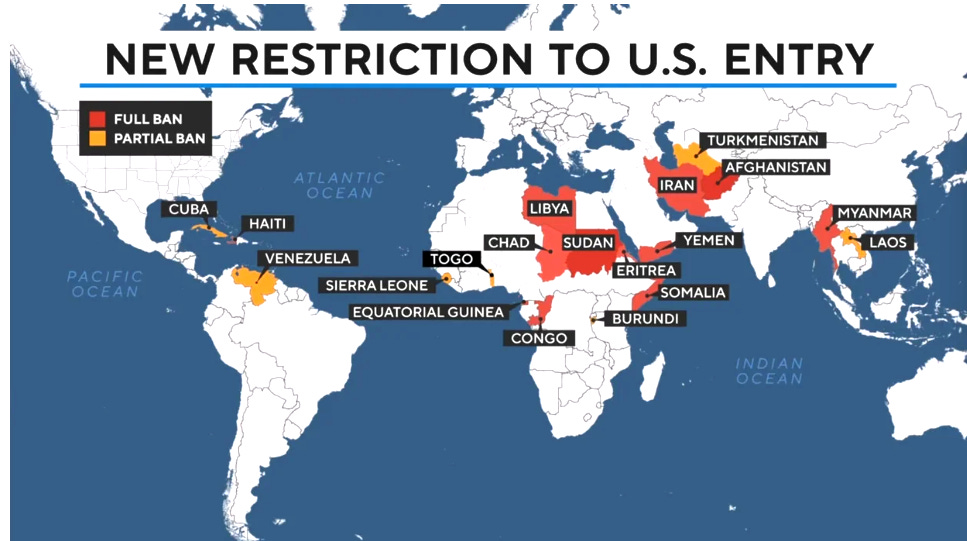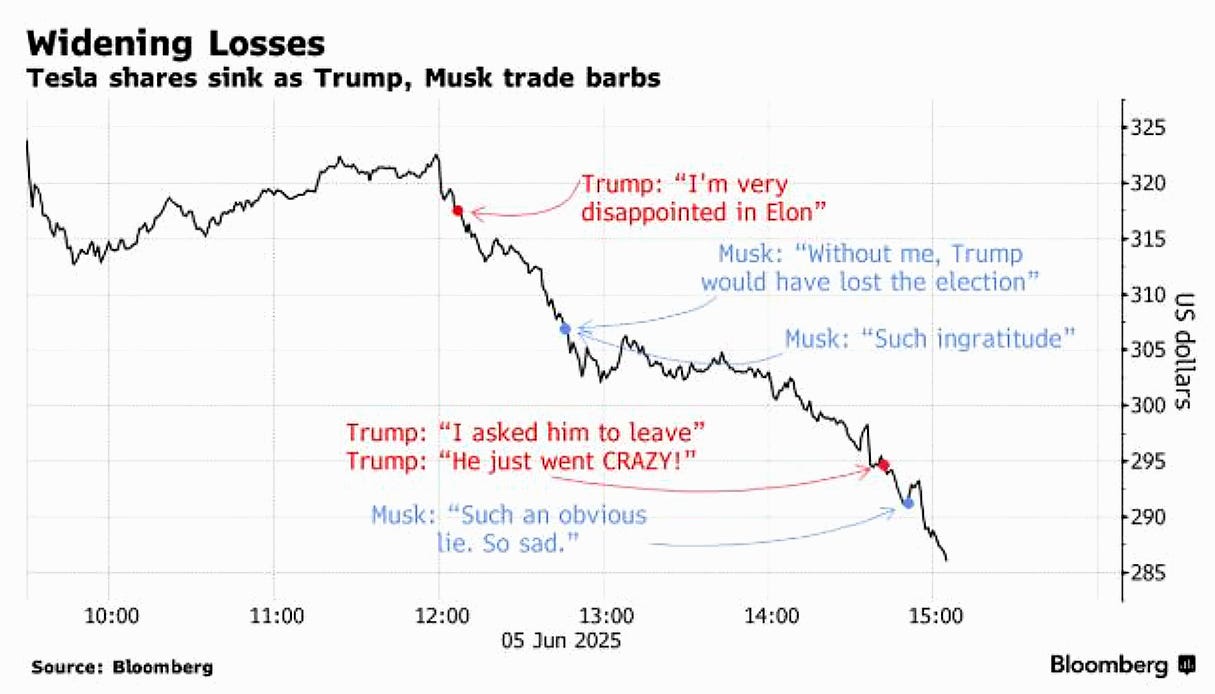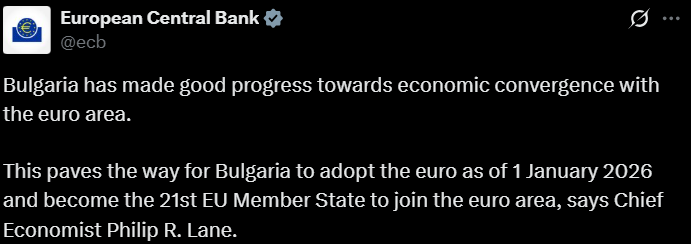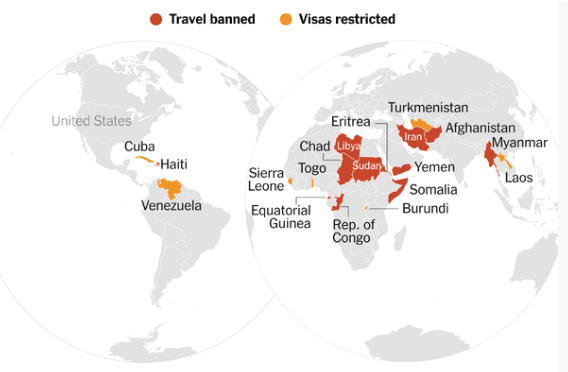Trump–Xi Agree to Resume Trade Talks, US Imposes Travel Bans, Swiss Federal Council Adopts the Crypto Data-Sharing Act, Australia Regulates Crypto ATMs, Bulgaria to Join Eurozone by 2026, and More
Grinfi Political Risk Intelligence Weekly Briefing
Welcome to this week’s edition of Grinfi Political Risk Edge, your trusted source for expert political risk analysis and strategic intelligence. In this issue, we examine key geopolitical events shaping the defense, energy, and DeFi markets, providing a deep, beyond-the-headlines assessment. Anticipate, Adapt, and Excel!
But first, let’s begin the week with a laugh 😄 to brighten the mood.
Help us serve you better and improve Grinfi Political Risk Edge by taking this brief, fully anonymized reader survey.
"The waning of the military element in international relations is allowing the logic of conflict to re-emerge in the form of geo-economics, in which the pursuit of adversarial goals is conducted with commercial means."
Edward N. Luttwak. 1990. “From Geopolitics to Geo-Economics: Logic of Conflict, Grammar of Commerce.” The National Interest, no. 20 (Summer): 17–23.
Disclaimer: The opinion expressed in this quote does not represent our views but is intended for reflection purposes only.
From Grinfi Political Risk Observatory (GPRO), here’s what we’re monitoring:
High Impact Situational Updates
MAJOR HEADLINES
— Trump and Musk Clash Publicly Over the 'Big, Beautiful Bill'
On June 5, a public spar between President Trump and Tesla CEO Elon Musk deepened over the so-called “One Big Beautiful Bill,” a $4.8 trillion tax and spending package. Musk, who recently left the administration where he headed the Department of Government Efficiency (DOGE), denounced the bill on X as a “disgusting abomination” for attempting to add $2.4 trillion to the U.S. deficit over ten years, according to Congressional Budget Office estimates.
The bill includes $1.2 trillion in corporate tax cuts, $800 billion in defense spending, and $500 billion for border security, along with what Musk labeled "pork-filled, outrageous spending."
Trump retaliated on Truth Social, accusing Musk of “Trump derangement syndrome (TDS),” claiming he was going crazy over the rollback of electric vehicle mandates, and threatening to cancel SpaceX and Tesla government contracts worth $19 billion annually. Musk, however, threatened to decommission SpaceX’s Dragon capsule from NASA missions, though he later walked back the statement. He also suggested that the FBI had not released the Epstein files because Trump was allegedly on Epstein’s list.
Here are some screenshots of the Trump-Musk fiery exchange:
In the aftermath, Tesla’s stock plummeted by 14% on June 5, losing $150 billion in market value, before recovering 6% by June 6 following signals of a possible reconciliation.
The ongoing feud has threatened Republican cohesion, with the party’s electoral prospects hanging in the balance as the 2026 midterm nears. Trump has warned Musk of "severe consequences" if he funds Democratic candidates in next year's elections.
Several MAGA Republicans have called for a ceasefire between Trump and Musk, but the attacks have continued. Musk has launched separate criticisms at House and Senate Republicans who support the reconciliation bill. Other Republicans have joined him in opposing aspects of the legislation, with several members of the House admitting they did not fully read the bill before voting for it.
As the fight drags on, deeper fractures are beginning to widen within the MAGA base. Observers are now openly questioning whether the movement can survive post-Trump. Neoconservative affiliates are increasingly clashing with isolationists, who shaped the movement’s original anti-interventionist identity. The split is also intensifying between those demanding accountability for Israel’s actions and those insisting on unconditional support.
— Ukraine’s Surprise Strike on Russian Airfields Sparks Retaliation Threats
On June 1, Ukraine executed a sophisticated covert drone operation, codenamed “Operation Spider’s Web,” striking five Russian military airfields: Belaya, Dyagilevo, Ivanovo Severny, Olenya, and Ukrainka. The attack deployed 117 first-person-view (FPV) drones, transported via trucks and launched from Russian territory, targeting aircraft across regions spanning multiple time zones. The farthest strike hit Belaya airbase in Eastern Siberia, approximately 4,300 kilometers from Ukraine’s border.
The Security Service of Ukraine (SBU) orchestrated the 18-month-long plan, using domestically produced drones operated remotely to minimize personnel risk. The offensive aimed to counter Russia’s intensified airstrikes on Ukrainian infrastructure, which had escalated in the preceding months.
According to SBU reports, the strikes damaged or destroyed over 40 aircraft, including Tu-22M3, Tu-95MS, Tu-160 bombers, and an A-50 early warning aircraft, with estimated losses valued at $7 billion. Independent OSINT analysis confirmed specific damages, such as four Tu-95MS and one An-12 at Olenya, and up to three Tu-22M3 at Belaya, though U.S. officials reported a lower count of 20 aircraft affected, with 10 destroyed.
The operation enormously disrupted Russia’s long-range aviation capabilities, with Ukrainian sources claiming up to 34% of Russia’s strategic cruise missile carriers were impacted, a figure higher than the 20% estimated by Western analysts.
On June 4, Russian President Vladimir Putin, in a call with U.S. President Donald Trump, vowed “severe consequences” and labeled the strikes “terrorism.” Trump, mediating ceasefire talks, proposed sanctions on Russian oil exports but delayed their implementation to preserve negotiations.
The drone strikes and ensuing tensions risk derailing fragile U.S.-brokered ceasefire talks, with Trump already criticizing Ukraine for prolonging the war and complicating negotiations.
— Bulgaria to Join Eurozone by January 2026
On June 4, the European Commission and European Central Bank (ECB) approved Bulgaria’s accession to the Eurozone as its 21st member, effective January 1, 2026.
Bulgaria met all Maastricht criteria, including an average inflation rate of 2.7% (April 2024–April 2025), a budget deficit below 3% of GDP (projected around 2.8–2.9%), and a low debt-to-GDP ratio near 24%, well under the 60% threshold. The ECB praised Bulgaria’s banking sector reforms and economic convergence, though concerns remain about judicial independence and corruption, with Transparency International ranking Bulgaria 45th globally.
A dual-currency period with lev and euro will run from January to March 2026, with the lev phased out by July 2026.
The Bulgarian National Bank will adopt the euro at the fixed exchange rate of 1.95583 BGN per EUR, consistent with the existing currency board arrangement.
However, Bulgaria’s eurozone accession has become a divisive political issue, with the opposition organizing a series of protests and demanding that President Rumen Radev call for a referendum on the issue, something the president has refused to do. In fact, there was a huge brawl in parliament after news of Bulgaria’s acceptance into the eurozone broke.
A June 2025 Eurobarometer poll showed that 50% of Bulgarians were opposed to adopting the euro, while 43% were in favor. A violent public protest occurred in Sofia on May 31, with thousands of demonstrators opposing euro adoption over fears of price hikes and loss of sovereignty.
Although the euro adoption has been touted as a milestone in Bulgaria’s EU integration and is expected to bolster economic stability, trade, and investment, Bulgarians remain deeply distrustful of the process due to widespread public distrust of government institutions, rampant corruption, and the accompanying economic pain the adoption would inflict. The ECB projects an estimated 1.5% price increase in 2026.
Given Bulgaria’s fragile political system, growing opposition to euro adoption could fuel widespread anti-EU populist movements, especially if economic benefits are perceived as unevenly distributed. Notwithstanding, the formal accession process will continue with EU finance ministers’ approval later this month and a final vote expected on July 8.
— U.S. Imposes Full Travel Bans on 12 Countries, Partial Restrictions on 7 Others
On June 4, President Trump signed Executive Order 13987, imposing a full travel ban on citizens from 12 countries (Afghanistan, Burma (Myanmar), Chad, Republic of the Congo, Equatorial Guinea, Eritrea, Haiti, Iran, Libya, Somalia, Sudan, and Yemen), and partial restrictions were applied to seven countries (Burundi, Cuba, Laos, Sierra Leone, Togo, Turkmenistan, and Venezuela), suspending non-immigrant visa programs like H-1B and F-1 student visas, effective today, June 9.
The order cites “inadequate vetting procedures” and “elevated risks of terrorism and visa overstays.” This comes in light of the June 1 attack in Boulder, Colorado, where an Egyptian national, Mohamed Sabry Soliman, allegedly threw a gasoline bomb at pro-Israel demonstrators.
The Department of Homeland Security reported that the 12 banned countries accounted for 0.8% of U.S. visa overstays in 2024, raising questions about the ban’s scope, as countries like India and Brazil, with higher overstay rates, were excluded. Notably, China and Russia, despite frequent U.S. criticism, face no restrictions.
In retaliation, Chad’s President Mahamat Deby ordered an immediate halt to the issuance of visas to US citizens, calling the ban “unjust targeting.” The Republic of the Congo’s spokesperson described its inclusion as a “misunderstanding,” noting Congo’s lack of terrorist affiliations.
Venezuela’s Interior Minister Diosdado Cabello condemned the U.S. as “fascist” and advised Venezuelans to avoid travel to the United States.
The African Union warned that the ban could disrupt educational exchanges and trade. Haiti’s Foreign Ministry reportedly considered reciprocal measures, though










